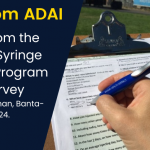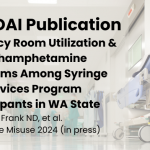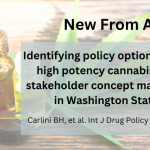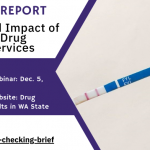Publications
July 9, 2024
New ADAI Report: Language Matters: Cannabis & Tobacco Use Among Youth of Diverse Racial/Ethnic Backgrounds

Citation: Language Matters: Cannabis and Tobacco Use Among Youth of Diverse Racial/Ethnic Backgrounds. Carlini BH, Harwick RH, Williams JR. Seattle, WA: Addictions, Drug & Alcohol Institute, Department of Psychiatry & Behavioral Sciences, School of Medicine, University of Washington, July 2024. Previous studies have highlighted the importance of acculturation — when someone adopts the values and…
June 11, 2024
New ADAI Publications on Cannabis and Opioid Policy

Several ADAI researchers have some new publications out recently related to cannabis and opioid policy: State Requirements for Non-Medical Cannabis “Budtenders” Beatriz Carlini, PhD, MPH, Research Associate Professor and Director of ADAI’s Cannabis Education & Research Program, is coauthor of a new paper on State requirements for non-medical US cannabis retail personnel (LoParco C, et…
May 6, 2024
Two New Reports from ADAI CEDEER: Kratom and Contingency Management

ADAI’s Center for Community-Engaged Drug Education, Epidemiology, and Research (CEDEER) has two new reports out this week! Kratom: What do we know about its use, safety, and overdose risk? Mandy Sladky, MSN, RN, CARN, and Caleb Banta-Green, PhD, MPH, MSW Kratom is a psychoactive substance made from the leaves of the Mitragyna speciosa tree that…
April 22, 2024
Results from the 2023 WA State Syringe Services Program Health Survey

Involving people who use drugs in meaningful ways to design and deliver the services offered to them is important. People who use drugs have clear preferences, insights, and innovative ideas for service models and are eager to share their perspectives when given genuine opportunities for input and involvement. To capture some of that vital information,…
February 29, 2024
New Research: Pharmacists Who Participated in the Respond to Prevent Intervention to Accelerate Provision of Harm Reduction Materials

Citation: Irwin AN, et al. “I go out of my way to give them an extra smile now:” A study of pharmacists who participated in Respond to Prevent, a community pharmacy intervention to accelerate provision of harm reduction materials. Research in Social and Administrative Pharmacy 2024 (in press). Community pharmacies are well-positioned to improve the…
February 27, 2024
New ADAI Publication: ER Utilization and Meth Overdose Symptoms Among Syringe Services Program Participants in WA

Citation: Noah D. Frank, Caleb J. Banta-Green, Brandon L. Guthrie, Susan Kingston, Joe Tinsley, Lauren Whiteside & Sara N. Glick. Emergency Room Utilization and Methamphetamine Overdose Symptoms Among Syringe Services Program Participants in Washington State. Subst Use & Misuse 2024 (in press). This new study co-authored by Caleb Banta-Green and Susan Kingston of ADAI’s CEDEER…
February 5, 2024
New from ADAI: Threaten, Distract, and Discredit: Cannabis Industry Rhetoric to Defeat Regulation of High THC Cannabis Products in WA

Citation: Carlini BH, Kellum LB, Garrett SB, Nims LN. Threaten, distract, and discredit: Cannabis industry rhetoric to defeat regulation of high THC cannabis products in Washington State, USA. Journal of Studies on Alcohol and Drugs 2024 (in press). doi: 10.15288/jsad.23-00277 Cannabis industry actors have adopted several arguments used by alcohol, pharmaceutical, food, and tobacco industry…
January 17, 2024
New from ADAI: Food Hardship as a Strong Predictor of Tobacco and Cannabis Use by WA Youth

Citation: Harwick RM, Carlini BH, Williams JR. Food hardship as a strong predictor of tobacco and cannabis use among youth in WA state. Children and Youth Services Review 2024;157:107427. (free link, available through March 4) This brief report from ADAI researchers Robin Harwick, PhD, MS, Beatriz Carlini, PhD, MPH, and Jason Williams, PhD, examines data…
December 7, 2023
New Paper from CERP: Identifying Policy Options to Regulate High Potency Cannabis

Citation: Carlini BH, et al. Identifying policy options to regulate high potency cannabis: Multiple stakeholder concept mapping study in Washington State, USA. International Journal of Drug Policy 2024;123:104270. Dr. Beatriz Carlini, Sharon Garrett, and Lexi Nim, of ADAI’s Cannabis Education & Research Program (CERP), have a new paper out that aims to describe and contextualize…
November 27, 2023
NEW ADAI Brief: The Use and Impact of Community Drug Checking Services

How to cite the new ADAI Brief: Kingston S, Biamont B, Banta-Green C, WA State Community Drug Checking Network. The Use and Impact of Community Drug Checking Services. Seattle, WA: Addictions, Drug & Alcohol Institute, Department of Psychiatry & Behavioral Sciences, School of Medicine, University of Washington, November 2023. Drug checking services (DCS) provide ways…
Previous page Next page
